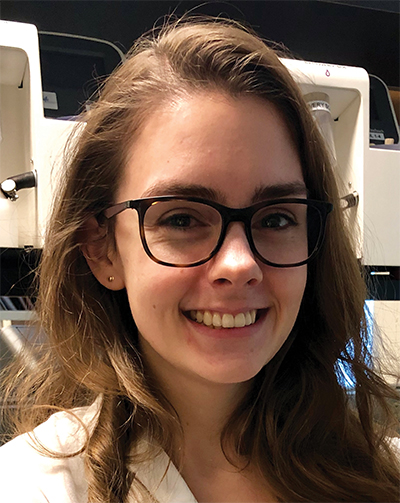Investigating genetic variants that underlie abnormal lipid phenotypes
Jacqueline Dron takes her research to heart — literally. When she’s not at the bench, you might find her playing flag football with friends, a hobby of hers for over eight years now.
“Physical sports are part of a healthy lifestyle,” she said. “In a lipids lab, healthy living is always encouraged.”
 Jacqueline Dron analyzed more than 1,000 DNA samples to determine what genetic factors might be related to abnormal levels of cholesterol or triglycerides.
Jacqueline Dron analyzed more than 1,000 DNA samples to determine what genetic factors might be related to abnormal levels of cholesterol or triglycerides.
Dron, a graduate student at in Ontario, Canada, was selected by the Journal of Lipid Research to speak in a special session featuring up-and-coming researchers at the 91ÓḞṡâ and Molecular Biology annual meeting. She will highlight her research on human genetic variants that influence plasma lipid and lipoprotein levels.
Dron has wanted to be a researcher for as long as she can remember. She thinks it’s the desire to make discoveries that made research so appealing.
“From there, it evolved into wanting to make discoveries that could one day be used to help others,” she said. “That is probably why I was drawn towards human genetics.”
Since starting graduate school in lab in 2015, Dron has analyzed over 1,000 DNA samples from patients that have abnormal levels of cholesterol or triglycerides. Her goal was to identify what genetic factors were involved in influencing these lipid phenotypes.
Unsurprisingly, the answer was not simple. Many phenotypes are influenced by multiple genetic factors, making the analysis complex. Nonetheless, Dron has been able to identify several key genetic variants that influence cholesterol and triglyceride levels in humans.
Dron is still actively analyzing new genetic variants and isn’t daunted by the complexity.
“I like being challenged and having a change of pace,” she says. “Almost everything (in research) is a challenge, and the pace is always changing.”
Genetic influences on lipid levels
Elevated levels of cholesterol and triglyceride lipids are risk factors for diseases such as stroke and heart attack, and Jacqueline Dron has a simple research question — what genetic variants cause these abnormal lipid levels?
To find the answer, Dron has studied over 1,000 DNA samples from patients with abnormal lipid levels to identify correlated genetic variants.
It turns out her straightforward question has a complicated answer. Her research shows that most patients have polygenic susceptibility, meaning they are simultaneously influenced by multiple genetic variations. This means that there generally isn’t any one gene that causes the abnormality. Instead, it’s the sum total of many genetic variants.
Despite this additional layer of complication, Dron has been able to identify genetic variants that influence extremely high plasma levels of the “good” HDL cholesterol as well as extremely high levels of triglycerides. She also has described how structural changes in several key genes are correlated with extremely low HDL cholesterol levels in some patients.
Her work has improved our understanding of the underlying genetic causes of variable plasma lipid levels. She has published two papers in the JLR, and , related to this work.
Enjoy reading 91ÓḞṡâToday?
Become a member to receive the print edition four times a year and the digital edition monthly.
Learn moreGet the latest from 91ÓḞṡâToday
Enter your email address, and weâll send you a weekly email with recent articles, interviews and more.
Latest in People
People highlights or most popular articles

In memoriam: Ralph G. Yount
He was a professor emeritus of chemistry and biochemistry at Washington State University and an 91ÓḞṡâmember for 58 years.

From dust to discovery
From makeshift classrooms in Uganda to postdoctoral research in Chicago, MOSAIC scholar Elizabeth Kaweesa builds a legacy in womenâs health.

Fliesler wins scientific and ethical awards
He is being honored by the University at Buffalo and the American Oil Chemists' Society for his scientific achievements and ethical integrity.

Hope for a cure hangs on research
Amid drastic proposed cuts to biomedical research, rare disease families like Hailey Adkissonâs fight for survival and hope. Without funding, science canât âcatch upâ to help the patients who need it most.

Before weâve lost what we canât rebuild: Hope for prion disease
Sonia Vallabh and Eric Minikel, a husband-and-wife team racing to cure prion disease, helped develop ION717, an antisense oligonucleotide treatment now in clinical trials. Their mission is personal â and just getting started.

91ÓḞṡâmembers recognized as Allen investigators
Ileana Cristea, Sarah Cohen, Itay Budin and Christopher Obara are among 14 researchers selected as Allen Distinguished Investigators by the Paul G. Allen Family Foundation.

